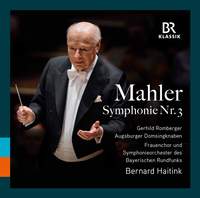Recording of the Week,
Bernard Haitink conducts Mahler's Third Symphony
Thrilling though it often is to hear performers setting down their first interpretation of a seminal work on record, there’s a special pleasure to be had from hearing veterans return to a piece which they’ve lived with for decades, and Bernard Haitink’s new Mahler 3 with the Bavarian Radio Symphony Orchestra (out this month on BR Klassik) provides just such pleasure. Haitink first recorded the Third fifty years ago (and there are three other recordings from him in our current catalogue), but spent much of last year re-immersing himself in the work. His performance with the London Symphony Orchestra and Sarah Connolly at the 2016 BBC Proms was touted as one of the highlights of the season and indeed of his long-standing relationship with the festival; I caught the concert on iPlayer the following day and if anything, this new recording (made during live performances in Munich a couple of weeks earlier) is even finer in terms of the tautness of ensemble and the energy and focus which Haitink and his Bavarian forces sustain over the work’s 100-minute span.

Haitink has long been regarded as one of our least egocentric and interventionist conductors, and I don’t think I’ve ever felt that more keenly than on this recording (even in comparison to his earlier accounts of the work on disc): throughout the long first movement in particular, there’s a sense that the music is simply being allowed to unfold itself organically rather than being driven too hard or conscientiously sculpted in any way. Haitink’s Mahler has never been about blood and thunder (an approach which, for me, pays more dividends in this particular symphony than it perhaps does in others), and right from the opening horn fanfare and subsequent trombone solo there’s a complete absence of bombast here: instead, the low brass-playing’s characterised by a kind of marcato buoyancy which provides just the right injection of energy for the ensuing thirty minutes, which in other hands can meander or sag. The other notable (and perhaps more controversial) absence here is vulgarity: Haitink never overplays the folkish elements of Mahler’s writing (be it the military fanfares imprinted on the composer’s imagination from childhood, or the rustic wind and fiddle solos which punctuate his Pantheistic vision of spring), and whilst some listeners may prefer their Mahler to sound a little less urbane than it does here, I found it refreshingly uncaricatured. There’s no suggestion of blandness or disengagement: Haitink simply observes every marking in the score to the letter, but never exaggerates or labours them. Each one of the composer’s myriad shifts in dynamic and tempo registers - thanks in no small part to the excellent sound-engineering, which catches every nuance even in the most hushed passages, I’ve never been so aware of the difference between a triple pianissimo and a quadruple one!
The singing of the German contralto Gerhild Romberger (and with no disrespect to the many wonderful dramatic mezzos who’ve taken on the work, what a difference it makes to have a true contralto here!) is in perfect accord with Haitink’s relatively restrained vision of the symphony as a whole. This is a singer who does very little stage work, concentrating instead on concert and oratorio repertoire, and whilst she offers an easy, unforced projection the voice is firm and focused rather than operatically opulent; it works beautifully, as does her way with the text, which is introspective rather than declamatory. The well-drilled young singers of the Augsburger Domsingknaben are the perfect foil in the fifth movement, neither too blandly seraphic nor overly pert and folksy in their contributions. Other highlights are the posthorn solo in the scherzo, which truly seems to emanate from another dimension here, and a last movement which unfurls like a simple but sublime benediction. If this is to be the Dutch maestro’s final word on this score on disc, it’s a crowning glory to a fifty-year relationship with one of the richest and strangest symphonies in the repertoire.
Gerhild Romberger (mezzo-soprano), Augsburger Domsingknaben, Frauenchor und Symphonieorchester des Bayerischen Rundfunks, Bernard Haitink
Available Formats: 2 CDs, MP3, FLAC, Hi-Res FLAC



